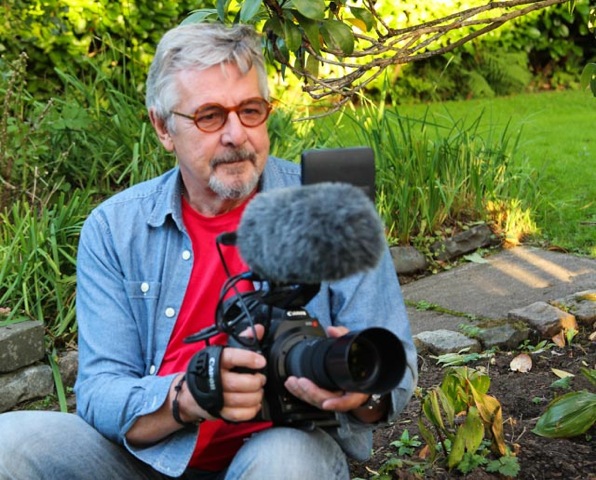
Award-winning broadcaster and director David Street (pictured above) made programmes for all the main UK’s TV channels before he turned to feature documentaries. Here he describes his career progression.
Getting the work habit
I was brought up in a small village in the peak District of Derbyshire. My family had a building firm so I spent most of school holidays working for the firm.
I had a variety of other weekend and holiday jobs during my teens, like paper rounds, Christmas postie, working in a textile factory, serving in a post office, but always it came back to working for the builders. By the time I left college as a qualified Art and Drama teacher at 21, I was running building sites, responsible for 50 or more men, often two or three times my age building a 100 plus homes at any one location. I was working 12 hour days often 7 days a week. After 18 months, a disagreement with one of my uncles, who was running the business, ended in me walking out.
Striking it Lucky
It was a two and a half mile walk to the next village where I lived, time to pull my thoughts together. I bought a Manchester Evening News and in the classified jobs section someone had written an advert just for me – or at least that’s what I felt. They wanted some one between the ages of 21 and 25 – I was just 23, with an interest in Drama and Art – my qualification, who enjoyed watching TV – one of the reasons I’d been made to go to work as a youngster was because I was getting “square eyes” from watching too much TV. It couldn’t have been better.
I applied and after 2 interviews I was offered a job as a trainee assistant film librarian at Granada TV in Manchester – working 40 hours a week for 3 times the wages I’d received in the family firm. When I was told later that over 350 people had applied for the job I couldn’t believe my luck. I was given a great piece of advice on my first day, I was wide eyed and star struck being amongst the cast of Coronation Street, my boss Keith Thompson, just leaned over and whispered in my ear “they go to the toilet, just like you and me” bingo.
“Square eyes” was now getting paid to do what he loved doing, watching TV, or to be more precise, watching and logging TV films and clips – it was a fabulous time to be at Granada. The Bernsteins still owned the company but let Denis Foreman and David Plowright run it. I was watching material shot by the Mikes’ Apted and Newell, Johnathan Powell, Roland Joffe and the brilliant Leslie Woodhead, I was learning by osmosis, listening, watching soaking it all up. After a couple of years I made the move into the cutting rooms, as an assistant film editor working with such brilliant editors as the late Kelvin Hendrie on World in Action, Stan Challis and Tony Ham on drama’s like Country Matter’s or doing inserts for Coronation Street.
It was a different world. We had to be in before the editor, make sure the Acmade or Steenbeck was running smoothly, all chinagraphs sharpened, clean selvits to hand, no dust or single frame trims lying around and get teas and coffees before they were even asked for. Many would now see this as the bad old days, but for me the privilege of being in edits with brilliant programme makers such as Brian Moser, Gus Macdonald, Ray Fitzwalter, Brian Blake, a very young Steve Morrison and the inimitable Leslie Woodhead was a privilege. I was watching how they worked, how they thought, what they liked and what they thought was crap. It was a brilliant education. So brilliant, I feel sad that people coming in to the industry now don’t appear to have the opportunity to do this.
Setting up on my own
While working at Granada I met the fantastic animators Mark Hall and Brian Cosgrove, they were going to set up Cosgrove Hall in an old tobacco warehouse in Chorlton-cum-Hardy – I took a couple of room’s there, bought a couple of Steenbecks and set up David Street Editing Ltd with a contract to cut all Mark and Brian’s work.
Working with brilliantly talented animators and their proteges such as Chris Taylor, Jackie Cockell and Barry Purvis gave me a fabulous insight into the precision and accuracy of animated film making. During this period I started editing TV commercials. I found the discipline of telling a 30 second story fascinating and wanted to do it myself.
Buying the T shirt
This was my move in to Directing and Producing. It was a time when you had to have a showreel – no one would give you the chance to do it if you couldn’t prove you could do it – sort of Catch 22. Saving short ends from various commercial shoots, I eventually built up enough stock to shoot three commercials and with help from camera hire companies and labs I had a showreel. That was me a director – I could wear the T shirt.
Decades later after countless TV commercials and programmes I reverted to the same basic principles to prove I could make a feature documentary. Fortunately now the equipment is so much cheaper, shooting digitally and the computerisation of edit systems means you don’t need labs to process the film you can virtually do it all on your laptop, so that is how BATTLE MOUNTAIN Graeme Obree’s Story started. To get it finished though required a virtual army of brilliant people who all brought their own particular talents and skills to it.
Many more than five jobs later the basic principles I learnt in those early jobs on building sites, in shops and factories are still important. Turn up on time, be enthusiastic, work hard and never stop learning.
Read more about BATTLE MOUNTAIN in David’s My Process article Central Station here.
//////
We’ve asked professionals in creative industries what jobs they have had in the past to get their foot through the door (or at least pay the rent). For more in the “My First 5 Jobs” series look here.














Comments